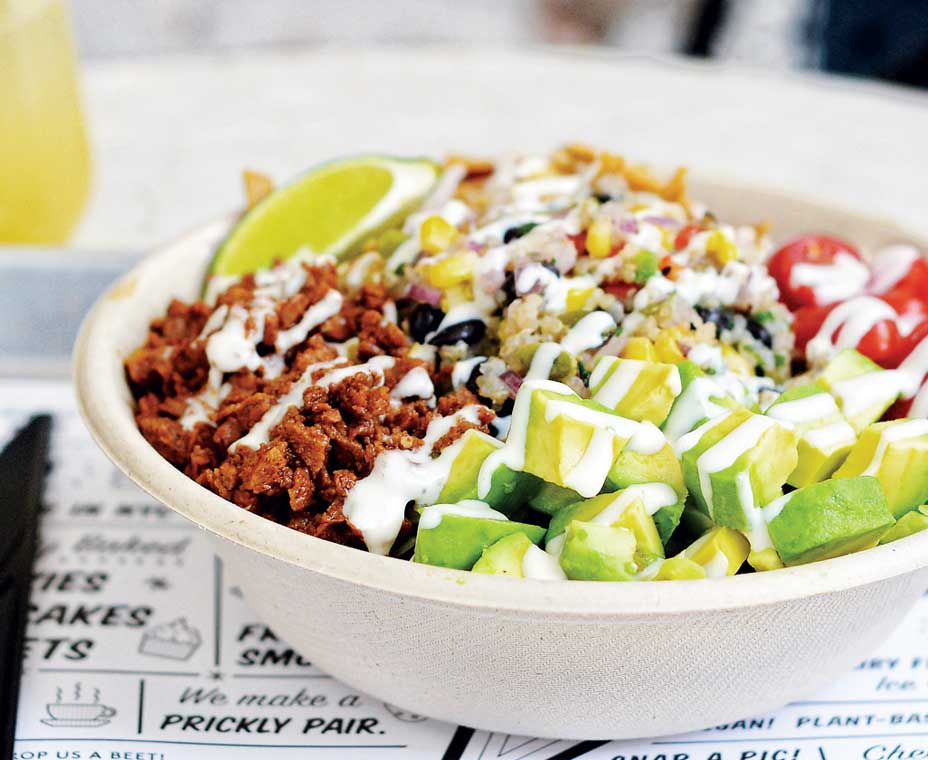Eating has seriously evolved in recent years. In a digital age, food trends seem to come and go faster than the click of a send button. But for quick-service and fast-casual operators, one recent movement has planted its roots deep into their consumer base, even as it’s morphed and evolved along with other dining trends.
At first blush, mindfulness—promoting guests’ overall well-being rather than simply focusing on more nutritious menu items—might seem to be everything the quick-service industry stereotypically is not. Whereas quick service has long strived to be quick, convenient, and indulgent, mindful dining is more focused, purposeful, and life affirming.
But in the new quick-service and fast-casual paradigm, brands are increasingly expected to be all of those things.
Mindfulness is not about dieting. Perhaps that’s why, in a survey late last year of 1,700 registered dietitians by Today’s Dietitian, nearly half said they find dieting troublesome and, instead, recommend that consumers focus on mindful eating. The dietitians defined mindful eating as choosing foods based on a wholesome ingredient list and a high level of proteins and carbs.
This sense of mindfulness has become the cosmic core of some fast-casual chains. At Saladworks, CEO Patrick Sugrue recently hired executive chef Andy Revella, who immediately made several “mindful” changes. Among them: He added more fresh, in-demand items to the menu, including kale and quinoa, and he put more emphasis on seasonal offerings. Among the offerings he added is something he dubbed the Winter Power Salad, which is made with a fresh lettuce blend, spinach, onions, sage, roasted potatoes, julienned beets, roasted squash, cantaloupe, and grilled chicken breast raised without antibiotics.
Mindfulness, Revella says, is etched into the DNA at Saladworks. “For me, the No. 1 thing is awareness,” he says. “This is not just about a healthy diet. It’s awareness of your impact on life, from the atmosphere of your restaurant to all of the little things that make the eating experience not just a fulfillment.”
Sugrue says running a successful fast-casual chain has become similar to running a wine business, where nuances like weather patterns, soil conditions, and when and where the grapes were picked become critical to the business. “It’s about understanding what you’re putting on your plate,” he says. “What is the nutritional value? Where does it come from? How is it prepared?”
Mindful eating is not about counting calories, Sugrue says. It’s not about some heavily prescribed diet. “It’s about recognition and knowledge of the food,” he says. Or, as Revella says: “Mindful eating is not one-dimensional.”
The biggest driving force behind mindful eating is millennials, Sugrue says. More than 20 percent of millennials, he says, are either vegetarian, vegan, or pescatarian. That’s a pretty dramatic eating shift in a fairly short time. “These are people who want to know the story behind the food,” he says.
But the “mindful” trend is not limited to millennials, Sugrue says. He points to the 75 million baby boomers who are also often looking for healthful alternatives. Boomers, he says, are a generation that has broadly been “reverse-mentored” by their millennial children. “My kids keep challenging me to try new things,” he says. “We learn from our kids.”
This has led the chain to create something dubbed the Saladworks White Bar, which the brand is planning to roll out in the next year or so. It’s a kiosk located by the salad bar that helps to specifically guide eating decisions for vegetarians, vegans, or folks with other special diets. If you state that you are a vegan, for example, all salad-bar items that aren’t vegan are grayed out of the kiosk menuboard.
Sugrue says mindful eaters are here to stay. “Mindful eaters put their forks down and eat slowly,” he says. “They have learned to pay attention and eat mindfully so they don’t grow up to be on a bunch of meds.”
On a much smaller—but, perhaps, even more urgent—scale, Samantha Wasser has made mindful eating the very manta of her new fast-casual chain. She also is cofounder and president of by CHLOE, a vegan chain that has five locations. It has plans to open six to 10 additional locations over the next year.
To Wasser, the essence of mindful eating is making things from scratch with the very best ingredients. That is what by CHLOE does with its vegan burgers; its classic burger is made from lentils, walnuts, and quinoa.
Sometimes, though, reality gets in the way of mindfulness. For example, Wasser wants to use as many organic ingredients in her offerings as possible, but that can get very pricey. Certain products the restaurants use vast amounts of—such as kale and avocado—she often doesn’t buy organic because the menu prices would skyrocket, she says.
For other restaurants that want to embrace a more mindful aura, she suggests that one of the most crucial components is educating the staff. “They need to know about what’s coming from where and why,” she says. The restaurant does weekly staff trainings “so we’re all on the same page.”
And being mindful goes well beyond the food, she adds. It’s not just what you put in your body, but what surrounds you and your restaurant. “I just ordered a new lamp that supposedly gives off positive ions,” she says. “Why not?”
This story originally appeared in QSR’s April 2017 issue with the title “Mind Your Business.”












